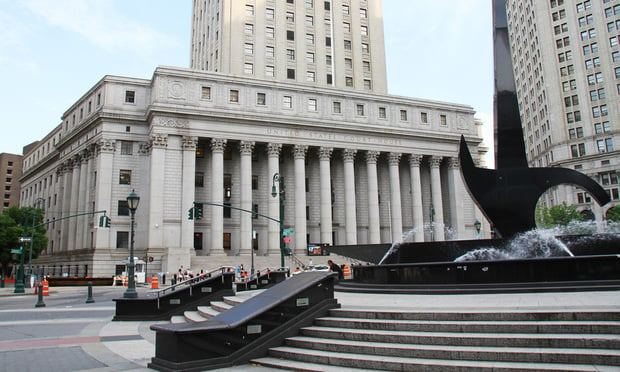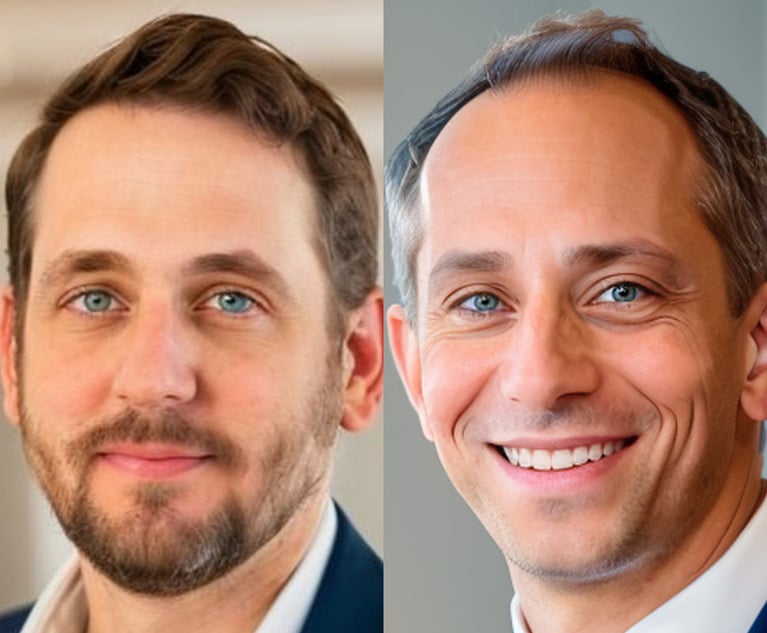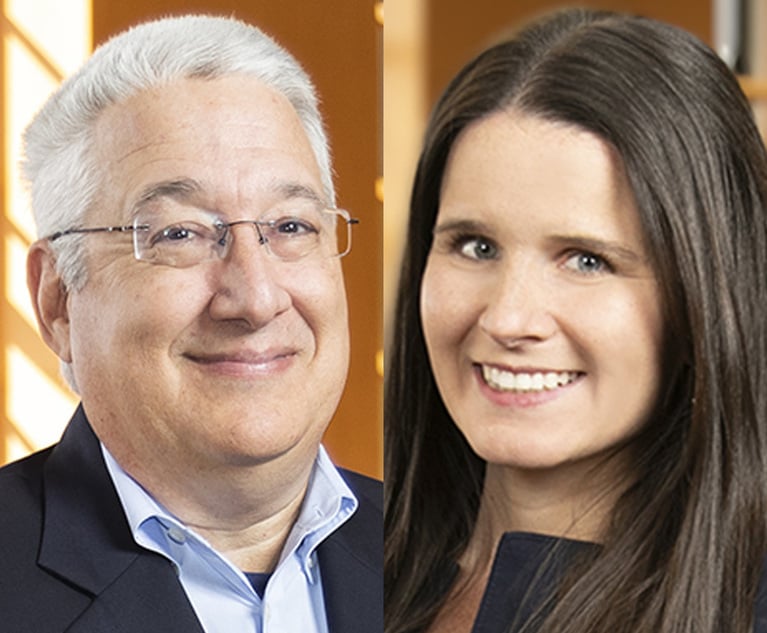2nd Circ.: Creditors Barred From Recovering Money Paid to Tribune Investors in Leveraged Buyout
A three-judge panel of the Manhattan-based appeals court said that the creditors' state law claims for constructive fraudulent conveyance were preempted by a provision of U.S. bankruptcy law, which protects certain transactions involving securities contracts.
December 19, 2019 at 06:30 PM
3 minute read
The original version of this story was published on New York Law Journal
 U.S. Court of Appeals for the Second Circuit. Photo: ALM
U.S. Court of Appeals for the Second Circuit. Photo: ALM
A group of creditors from the Tribune Media Co.'s 2008 bankruptcy cannot recover money paid to the defunct firm's investors in leveraged buyout before the company filed for Chapter 11 protection in Delaware, the U.S. Court of Appeals for the Second Circuit ruled Thursday.
A three-judge panel of the Manhattan-based appeals court said that the creditors' state law claims for constructive fraudulent conveyance were preempted by a provision of U.S. bankruptcy law, which protects certain transactions involving securities contracts.
The U.S. Supreme Court last year narrowed the scope of the Section 546(e) safe harbor to exclude certain fraudulent transfers made through the "conduit" of a financial institution to a third party, giving new hope to creditors claiming that billionaire Samuel Zell's 2007 leveraged buyout had overpaid investors in exchange for returning their shares to Tribune.
U.S. District Judge Denise Cote of the Southern District of New York, however, denied their motion to amend the complaint in light of the high court's ruling, finding that Tribune was itself a "financial institution" that qualified for protection under the bankruptcy code. On appeal, the creditors argued that they regained the ability to pursue their state law claims after the bankruptcy trustee declined to pursue them within the two-year statute of limitations provided by federal law.
But Second Circuit Judges Ralph K. Winter and Christopher F. Droney said Thursday that the theory created a number of "ambiguities, anomalies and outright conflicts" with the federal bankruptcy statute. Among them, the judges said, was the possibility that bankruptcy proceedings could be held up while creditors pursue "piecemeal actions" brought by creditors.
"This is precisely opposite of the intent of the code's procedures," the judges wrote in a 75-page opinion.
"Any trustee would have grave difficulty negotiating more than a nominal settlement in the federal action if it cannot preclude state claims attacking the same transfers but not requiring a showing of actual fraudulent intent," Winter and Droney wrote. "Unable to settle, a trustee will be reluctant to expend the estate's resources on vigorously pursuing the federal claim while awaiting the stayed state claims to revert and to be litigated by creditors."
The judges were joined by U.S. District Judge Alvin K. Hellerstein of the Southern District of New York, who sat by designation.
In addition to the "disruptive effect" of the creditors' position, there were bigger policy concerns regarding the efficiency of securities market, which are subject to extensive federal regulations.
The appeals court noted that the broad language of 546(e) was meant to protect the market from "after-the-fact unwinding of securities transactions," which could expose investors in public companies to "substantial" risks.
For instance, the judges said, players in the market would face increased uncertainty surrounding their transactions, and institutional investors would find securities markets far more risky if they were exposed to liabilities from securities investments they made long ago.
"A lack of protection against the unwinding of securities transactions would create substantial deterrents, limited only by the copious imaginations of able lawyers, to investing in the securities market," they said.
Read More:
Weil Facing Sharp Fee Objections in Ditech Bankruptcy
EXCO Bankruptcy Illustrates Power of Chapter 11 Restructuring
Madoff Trustee Loses Bid to Recover $343M From Citi in Clawback Suit
This content has been archived. It is available through our partners, LexisNexis® and Bloomberg Law.
To view this content, please continue to their sites.
Not a Lexis Subscriber?
Subscribe Now
Not a Bloomberg Law Subscriber?
Subscribe Now
NOT FOR REPRINT
© 2025 ALM Global, LLC, All Rights Reserved. Request academic re-use from www.copyright.com. All other uses, submit a request to [email protected]. For more information visit Asset & Logo Licensing.
You Might Like
View All


Federal Judge Awards $1M to Plaintiff's Counsel Following a No Payment Shareholder Derivative Settlement

'Existential Risks': AI Anxiety Fueling Stream of Shareholder Proposals
Trending Stories
- 1Thursday Newspaper
- 2Public Notices/Calendars
- 3Judicial Ethics Opinion 24-117
- 4Rejuvenation of a Sharp Employer Non-Compete Tool: Delaware Supreme Court Reinvigorates the Employee Choice Doctrine
- 5Mastering Litigation in New York’s Commercial Division Part V, Leave It to the Experts: Expert Discovery in the New York Commercial Division
Who Got The Work
J. Brugh Lower of Gibbons has entered an appearance for industrial equipment supplier Devco Corporation in a pending trademark infringement lawsuit. The suit, accusing the defendant of selling knock-off Graco products, was filed Dec. 18 in New Jersey District Court by Rivkin Radler on behalf of Graco Inc. and Graco Minnesota. The case, assigned to U.S. District Judge Zahid N. Quraishi, is 3:24-cv-11294, Graco Inc. et al v. Devco Corporation.
Who Got The Work
Rebecca Maller-Stein and Kent A. Yalowitz of Arnold & Porter Kaye Scholer have entered their appearances for Hanaco Venture Capital and its executives, Lior Prosor and David Frankel, in a pending securities lawsuit. The action, filed on Dec. 24 in New York Southern District Court by Zell, Aron & Co. on behalf of Goldeneye Advisors, accuses the defendants of negligently and fraudulently managing the plaintiff's $1 million investment. The case, assigned to U.S. District Judge Vernon S. Broderick, is 1:24-cv-09918, Goldeneye Advisors, LLC v. Hanaco Venture Capital, Ltd. et al.
Who Got The Work
Attorneys from A&O Shearman has stepped in as defense counsel for Toronto-Dominion Bank and other defendants in a pending securities class action. The suit, filed Dec. 11 in New York Southern District Court by Bleichmar Fonti & Auld, accuses the defendants of concealing the bank's 'pervasive' deficiencies in regards to its compliance with the Bank Secrecy Act and the quality of its anti-money laundering controls. The case, assigned to U.S. District Judge Arun Subramanian, is 1:24-cv-09445, Gonzalez v. The Toronto-Dominion Bank et al.
Who Got The Work
Crown Castle International, a Pennsylvania company providing shared communications infrastructure, has turned to Luke D. Wolf of Gordon Rees Scully Mansukhani to fend off a pending breach-of-contract lawsuit. The court action, filed Nov. 25 in Michigan Eastern District Court by Hooper Hathaway PC on behalf of The Town Residences LLC, accuses Crown Castle of failing to transfer approximately $30,000 in utility payments from T-Mobile in breach of a roof-top lease and assignment agreement. The case, assigned to U.S. District Judge Susan K. Declercq, is 2:24-cv-13131, The Town Residences LLC v. T-Mobile US, Inc. et al.
Who Got The Work
Wilfred P. Coronato and Daniel M. Schwartz of McCarter & English have stepped in as defense counsel to Electrolux Home Products Inc. in a pending product liability lawsuit. The court action, filed Nov. 26 in New York Eastern District Court by Poulos Lopiccolo PC and Nagel Rice LLP on behalf of David Stern, alleges that the defendant's refrigerators’ drawers and shelving repeatedly break and fall apart within months after purchase. The case, assigned to U.S. District Judge Joan M. Azrack, is 2:24-cv-08204, Stern v. Electrolux Home Products, Inc.
Featured Firms
Law Offices of Gary Martin Hays & Associates, P.C.
(470) 294-1674
Law Offices of Mark E. Salomone
(857) 444-6468
Smith & Hassler
(713) 739-1250






